 Tsundoku, on 10 May 2019 - 09:06 AM, said:
Tsundoku, on 10 May 2019 - 09:06 AM, said:
 Andorion, on 09 May 2019 - 12:11 PM, said:
Andorion, on 09 May 2019 - 12:11 PM, said:
Its not that we did not have business before. The great Roman trade, the huge Arabian trade Empire in the Indian Ocean - all of that, but the individualistic, only profit-oriented capitalistic model is a lot more recent.
Fair enough. However I believe that private control of the means of production, leading to the pursuit of wealth for it's own sake has been with humanity forever.
Post medieval "industrialisation" just made it more obvious and efficient.
Depends how tightly or loosely you define it I guess.
Actually I think the concept of private property is far more complicated than what most people think.
Throughout medieval times, in Europe, land was the primary means of production and that was not really a transferable commodity. Widespread feudal serf-subsistence agriculture was the principal economic feature. Technically the feudal lords "owned" these lands, but they could not be sold, they could be transerred by marriage or inheritance. And land ownership rarely translated into moneymaking schemes. This was subsistence level stuff. Only after the 12th Century do we see large scale overland trade in surplus. In the cities, both crafts and trade were regulated by guilds.
Outside the west, the concept of individual private property meant something very different. In practice, families, castes, clans and professional groups owned property and managed the economy. The modern entrepreneur would be meaningless there. A merchant was defined by the community he belonged in. Craftsmen lived and worked as groups.
Even here, lets look at the primary means of production - Land. In India, land was not an owned commodity. Different groups had different rights to the land. The emperor had a right to the revenue, the local feudal lord had a right to his traditional dues, the local landlord had his rights and the peasant had the right not be thrown off the land but to cultivate it and keep his own portion of the produce.
This is what the colonizing British did not get. In Britain in the 16th century, after Henry VIII threw the Church of Rome out and confiscated the huge land of the monasteries and then this was sold to the gentry, who enclosed it and started farming. The "improving landlord" model had its birth here, in the enclosure movement which rapidly sought to take "commons" land and enclose it to make it private. In Britain land was private property, to be owned, exploited and improved. This is possessive individualism and in Locke and his contemporaries, you get lots of references to taking over "waste" land, "waste" being a code phrase to mean any land not owned and "improved"
This concept was attempted to be applied in India. In 1793 they concluded the disastrous Permanent Settlement in Bengal which tried to define the landlord as class as the land owners conditional on payment of revenue and peasants could be evicted. This settlement ignored a gigantic cluster of traditional rights and obligations, and caused a huge amount of misery.
So, no the concept of the private ownership of means of production can't be very easily generalized. Most of what is seen as normal capitalistic practice had its ideological birth in the 15th-16th centuries in West and matured from there.
 Tsundoku, on 09 May 2019 - 10:43 AM, said:
Tsundoku, on 09 May 2019 - 10:43 AM, said:
 Help
Help






















